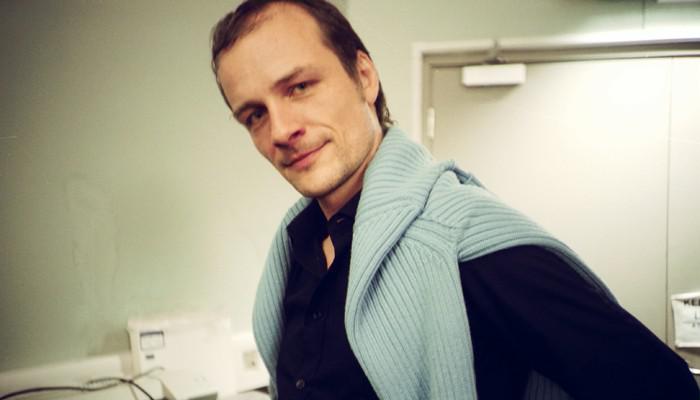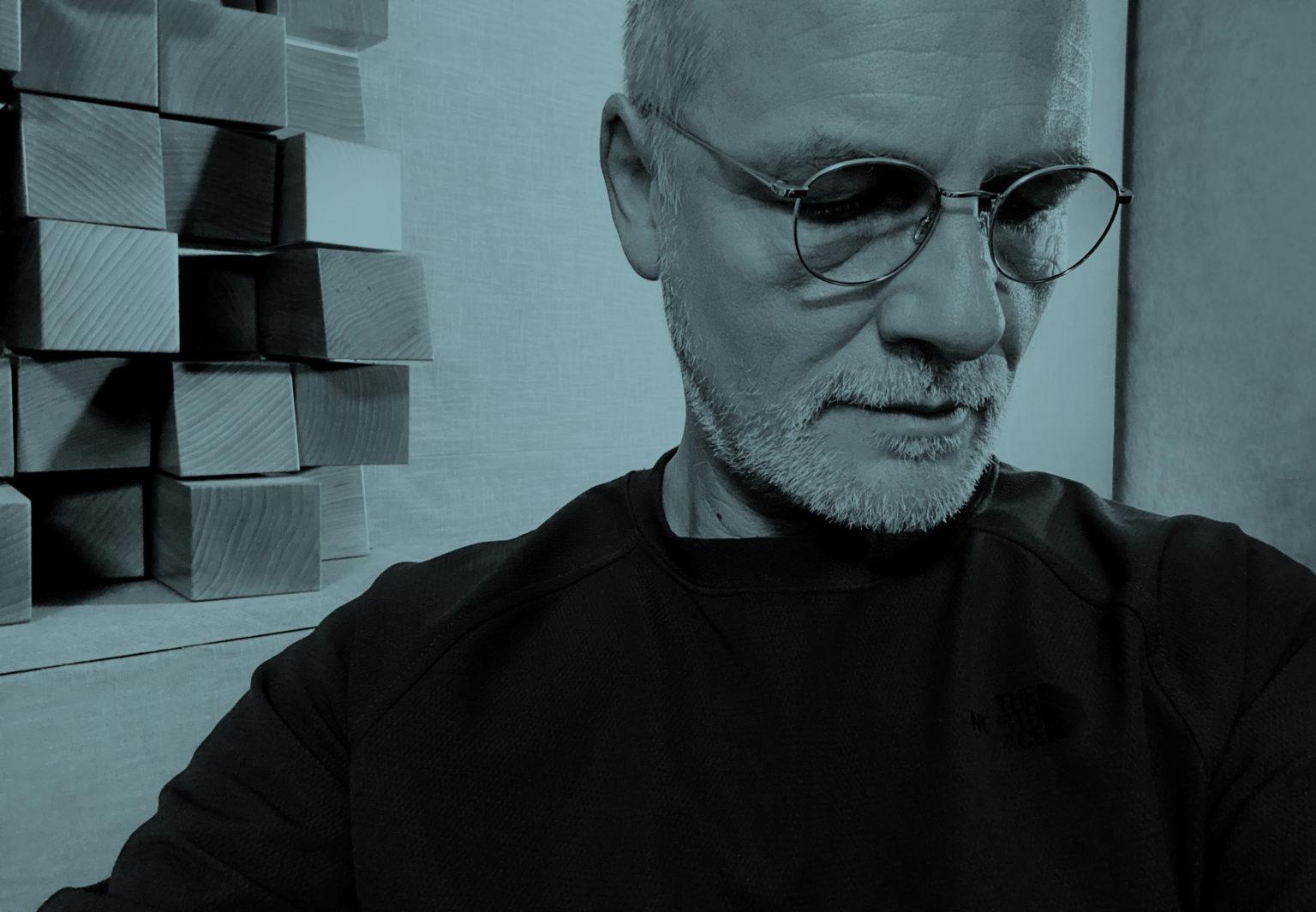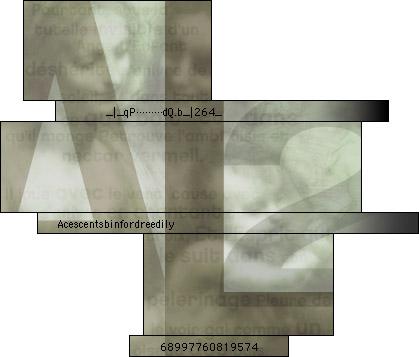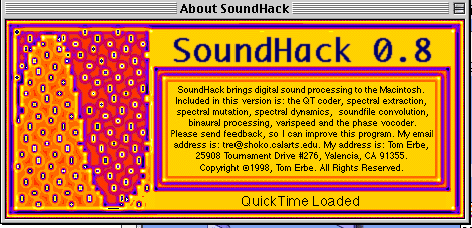Stephan Mathieu interview
Words and interview by RM.
When I read about Marc’s idea for a blog about “old macs“, Stephan Mathieu was on my mind right away. His oeuvre has a few references such as “The sad mac“, “FrequencyLib“, “Kapotte Muziek by Stephan Mathieu“ that somehow fit the topic and knowing how some of them came to live, it also fits the connotation of obsolete technology that might fail.

Stephan Mathieu 2001. Credit: Bryony McIntyre
Stephan Mathieu’s debut “Wurmlochvariationen” was recently re-released on Weeding, a Irish label. Originally released on CD on Ritornell in 2000, it is a collection of hypnotic tracks made out of aliasing and bitcrushed samples, sequenced carefully with subtle fades and layers.
Stephan’s music evolved over 20 years from the gritty textures to more ethereal blanket like sound objects. His love for entropic systems is also another highlight in my opinion, it is beautifully documented on the “Trace“ compilation.
I reached out to Stephan to get some more details. Here they are…
Which software did you enjoy most when you were using a Powerbook/OS9?
I was always a ProTools user, pre-OSX ProTools Free was my favorite since it was the most reliable version. I also used Max/MSP, actually my first version came with floppy disc authorisation. Even though I studied this for a while, I never really wrote my own tools, simply because I learned rather quickly that I simply lack ideas of what I want to build! What I made for myself was a tool that helped me with the live entropy which is of course time consuming. Play file > record through mic > play new recording > record through mic > etc. Other than that I used a handful of patches build buy friends, whereas what I did with them sounded completely different to what they did.
What is the difference of this older software compared to more recent software?
Then there is spectral editing which is now a breeze with Spectralayers and just as powerful as Photoshop. I want to switch from ProTools to Wavelab since it’s so much more handy when it comes to the routine tasks in mastering like tagging, exporting, assembling the master if various formats but I’m slow with the learning while I can handle PT in my sleep.

I see some lovely tools like Argeiphontes Lyre and Soundhack listed on Frequency Lib…
I made my first computer based production early in ‘95, still as a drummer with my friend Lupo in a brand new Protools driven studio where we had recorded, processed, mixed and mastered an EP entirely in the box. Since this was the studio’s maiden voyage we were able to work there pretty much around the clock for over a week. Back then I was not interested in computers, but at the end of day 1 I thought that I don’t want to go to a studio for this, I want this myself.
It took about 2 years until I buy my first Mac, the just released PowerMac 7300 running Protools 3 through an Audiomedia III interface and I found working in Protools surprisingly easy based on what I had learned 2 years earlier. My initial plan was to use the computer for live processing of my drum kit and also to record the upcoming album with my former band in our living room. First thing I did though was recording our piano. I’m not a pianist, so this was rather me playing chords by eye and ear, the tune that became Wurmloch. The same night I copied those 11 minutes through my room, recording 26 generations I’m Sitting In A Room style as material for a commissioned outdoor installation.
Next was recording my drums, but I ended up using only a snippet with one single hit on my floor tom to explore the plugins that came with PT, time stretch, Lo-Fi, Sci-Fi, Recti-Fi and the Orange Vocoder. The snippet became 11.55.330, and I was seriously hooked with DSP.
At the same time I discovered Argeiphontes Lyre and Soundhack and started processing the Wurmloch piano piece for what became the Variations.
With AL I love the esotherics and poetry involved and the one of a kind sound of the filters, with Soundhack it was the convolution algorithms that interested me since they seemed familiar to the analog entropic processes I was fascinated with since a while, but as a powerful digital beast that melts audio much differently.

Also Soundhack’s Header Change is something I used heavily to alter pitch and duration of material. This also lead to some heavy aliasing noise which I loved.

I had quite the steep learning curve with digital audio and in 1998 got in charge of an traditional electronic music studio in France, just across the border from where I lived. Apart from setting up their collection of analog synths and gear I had the chance to build a grown up Protools system based on their brand new 888 24 24-Bit interface where I would teach and digitize their archive of reels, DAT tapes and cassettes and was also able to work on my own stuff. The studio was associated with the GRM in Paris, so I had their GRM Tools available to play with and we also got Max/MSP and later their Pluggo suite once they became available. By that time I also got my first laptop, a Pismo along with a 24-Bit mobile interface, the Digigram VXPocket so I could work in my little home studio and easily bring the material to France to finish the pieces. Full Swing Edits, a series of reworks of other peoples music was done that way.
At some point I got really tired of using plugins as effects and also of arranging and fine-tuning pieces. Even my more complex pieces involved no more than 3 stereo tracks but I wanted to be less in control of the audio. By that time Full Swing Edits and Wurmloch Variationen had been released and I noticed that I would hear every decision I made during production and this sounded to forced to me. I started developing a system based on AL, Soundhack and MSP where the final output was a realtime stream that I would record over long durations and then select the best parts which I would EQ with a Calrec RQQ 2200 until they sounded right to me, sometimes over months. Die Entdeckung des Wetters on Lucky Kitchen was one result of this, later on Radioland which I had in the making between 2002-04.
In the end I’ve always used Protools for recording and editing, with AL, Soundhack and MSP as my processing tools while only the source material had varied until I stopped making music some years ago. I never felt the need for more processing power and used my computers until they died. I enjoy working with a very limited pallette. There was a time when I thought Kyma would be good to have, but after spending a while with a friend’s Capybara several years ago I again noticed that I simply lack the vision of what I want to do with the tools. What I’d love to see is a 2021 version of Tom Erbe’s convolution algorithms, this should be really inspiring on a modern computer and would probably get me back to working on music. I just love convolution of audio and entropy.